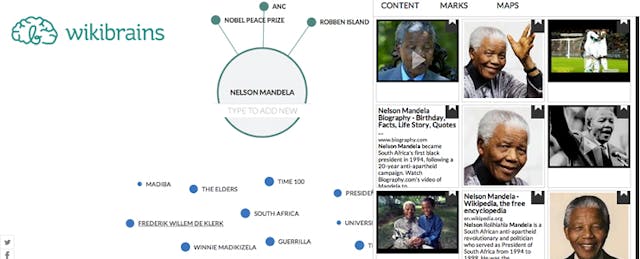Information on the Internet grows at an innumerable rate, and the plethora of text, images and videos can be overwhelming. Just ask any college student staring at a blank document about the frustration of connecting the pieces to find coherent ideas.
Israeli startup, WikiBrains, hopes it has a solution to ease that pain with a “knowledge discovery tool powered by the world’s largest brainstorm,” says co-founder, Leon Markovitz. Based in Tel Aviv, WikiBrains is part of the MindCET edtech accelerator program. The startup, founded in 2012, announced it has raised $750K from MindCET, Peter Sieradzki and other private investors.
WikiBrains offers an digital canvas where users can browse, modify, or create their own “mind maps,” a collection of related topics and sub-topics that are generated by users. Users can add new items and relationships to a public mind map, or create private ones. For every topic, the system serves a collection of relevant content from openly available resources such as Wikipedia, YouTube and the New York Times. The company is also currently working with the Harvard Library to make its millions of online records and resources accessible to users.
Markovitz says the company’s goal is to create a “dynamic meeting point where creative minds find, share, and collaborate on the topics they care about...Every mind has different perspectives and views, and we leverage it for the collective benefit.” He adds that as more mind maps are added, the platform uses “a smart data structure to provide a growing database of semantically linked information and knowledge.”
The idea of a mindmapping platform for learning is not new, but the Wikibrains’ co-founders believe that its emphasis on crowdsourcing the brainstorming of ideas distinguishes itself from others like InstaGrok and Mindomo. “Every topical association is based on what other students have looked at,” says co-founder and CEO, Jishai Evers. As a result, interesting connections may arise. A search for “Middle East,” he says, can return connections to topics as diverse as falafels and the Yom Kippur War.
One feature in the pipelines is the ability to search and filter by demographics. Evers tells EdSurge that “it will be interesting if you can compare the kinds of topical relationships that users in the U.S. and those in the rest of the world create about a particular subject.”
Since its launch in January 2013, the platform has 100,000 items of contributions from 10,000 active students. So far, the company focus is on helping university students with research assignments. It is currently doing a pilot with Windesheim University of Applied Sciences in the Netherlands, where students are using WikiBrains for a course on digital Innovation in education. "Wikibrains allows our Masters students to explore, construct knowledge and reflect on learning processes that is both social and fun," says Jael de Jong Weissman, a course designer and lecturer at Windsesheim.
The company is currently exploring several monetization options in the form of partnerships with reputable publishers for premium content that will be sold to students, school-wide licenses for universities, and sponsored content from companies with domain expertise.


